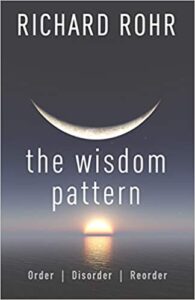Wisdom/Sophia
Sophia.
February 26, 2021Cynthia Bourgeault, An Introductory Wisdom School: Course Transcript and Companion Guide (Wisdom Way of Knowing: 2017), 2. Please note: Today is the last day to register for Cynthia’s Introductory Wisdom School online course.
Sophia: Koinē Greek: Σοφíα “Wisdom“, Coptic: ⲧⲥⲟⲫⲓⲁ “the Sophia”
W I S D O M
Center for Action & Contemplation
Fr Richard Rohr:
‘Wisdom is clearly more than mere intelligence, knowledge of facts, or information. Wisdom is more synthesis than analysis, more paradoxical than linear, more a dance than a march. In order to grow in wisdom, we need to move beyond cerebral, rational knowing. As wisdom teacher Cynthia Bourgeault puts it: “Wisdom is not knowing more, but knowing with more of you, knowing deeper.” I’ve created a list of seven “ways of knowing” that together can move us toward greater wisdom. Here are the first four:
Intellect: The lens that we most associate with knowing is intellectualknowing. It’s the result of formal education and it has to do with science, reason, logic, and what we call intelligence. Most of us are trained to think that it is the only way of knowing or the superior way of knowing. Yet that isn’t necessarily true. Seeing intellectual intelligence as the best or only way of knowing is actually a great limitation.
Will: The second way of knowing is volitional knowing. It comes from making choices, commitments, and decisions, then sticking with them, and experiencing them at different stages. Anyone who has made and then kept vows knows what I’m talking about. It is a knowing that comes from making choices and the very process of struggling with the choices. This knowing is a kind of cumulative knowing that emerges over time. The Franciscan scholar John Duns Scotus (1266–1308) felt that volitional knowing, or will, was higher and closer to love than intellectual knowing.
Emotion: Great emotions are especially powerful teachers. Love, ecstasy, hatred, jealousy, fear, despair, anguish: each have their lessons. Even anger and rage are great teachers, if we listen to them. They have so much power to reveal our deepest self to ourselves and to others, yet we tend to consider them negatively. I would guess that people die and live much more for emotional knowing than they ever will for intellectual, rational knowing. To taste these emotions is to live in a new reality afterward, with a new ability to connect.
Senses: Bodily or sensory knowing comes through the senses, by touching, moving, smelling, seeing, hearing, breathing, tasting—and especially at a deep or unconscious level. Becoming aware of our senses in a centered way allows us to awaken, to listen, to connect. It allows us to know reality more deeply, on our body’s terms instead of our brain’s terms. It is no surprise that Jesus touched most of the people he healed. Something very different is communicated and known through physical touch, in contrast with what is communicated through mere words.
Also,
‘Here are the three further “ways of knowing” that can allow us to access greater wisdom:’
Images: Imaginal knowing is the only way that the unconscious can move into consciousness. It happens through fantasy, through dreams, through symbols, where all is “thrown together” (sym-ballein in Greek). It happens through pictures, events, and well-told stories. It happens through poetry, where well-chosen words create an image that, in turn, creates a new awareness—that was in us already. We knew it, but we didn’t know it. We must be open to imaginal knowing because the work of transformation will not be done logically, rationally, or cerebrally. Our intellectual knowing alone is simply not adequate to the greatness and the depth of the task.
Aesthetic: In some ways, aesthetic knowing is the most attractive, but I think it’s often the least converting. Art in all its forms so engages us and satisfies us that many go no deeper. Still, aesthetic knowing is a central and profound way of knowing. I’ve seen art lead to true changes of consciousness. I have seen people change their lives in response to a novel, a play, a piece of music, or a movie like Dead Man Walking. Their souls were prepared, and God got in through the right metaphor at the right time. They saw their own stories clarified inside of a larger story line.
Epiphany: The last way of knowing, which I’d think religion would prefer and encourage, is epiphanic knowing. An epiphany is a parting of the veil, a life-changing manifestation of meaning, the eureka of awareness of self and the Other. It is the radical grace which we cannot manufacture or orchestrate. There are no formulas which ensure its appearance. It is always a gift, unearned, unexpected, and larger than our present life. We cannot manufacture epiphanies. We can only ask for them, wait for them, expect them, know they are given, keep out of the way, and thank Someone afterward.
“A universal pattern can be found in all societies and in fact in all of creation. We see it in the seasons of the year; the stories of Scripture; the life, death, and resurrection of Jesus; the rise and fall of civilizations; and even in our own lives. In this new version of one of his earlier books, Father Richard Rohr illuminates the way understanding and embracing this pattern can give us hope in difficult times and the courage to push through messiness and even great chaos to find a new way of being in the world.”
Adapted from Richard Rohr, The Wisdom Pattern: Order, Disorder, Reorder (Franciscan Media: 2020), 121–127

